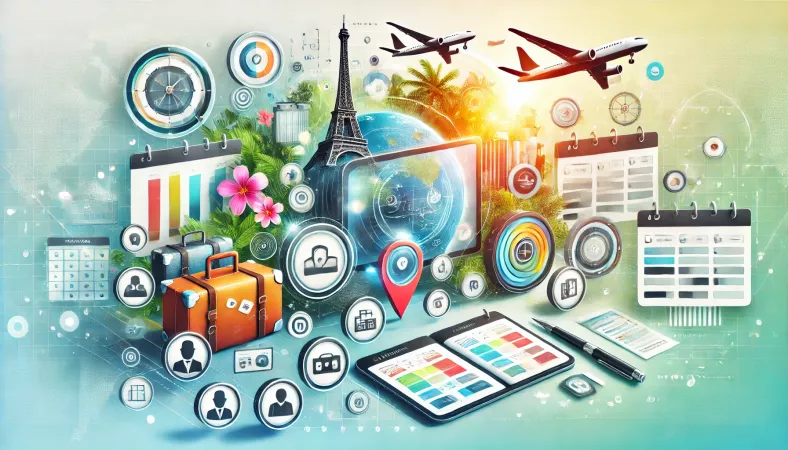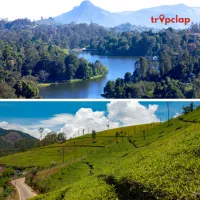Understanding Travel CRM: Features, Benefits, and Implementation
Understanding Travel CRM: Features, Benefits, and Implementation
In the competitive landscape of the travel industry, effective customer relationship - Tripclap

Understanding Travel CRM: Features, Benefits, and Implementation
In the competitive landscape of the travel industry, effective customer relationship management (CRM) is crucial for enhancing client interactions and streamlining operations. A **Travel CRM** is a specialized software designed to help travel agencies and professionals manage customer relationships, bookings, and overall service delivery efficiently. This article explores the key features, benefits, and implementation strategies for Travel CRM systems.
What is Travel CRM?
Travel CRM refers to a software solution tailored specifically for the travel sector. It consolidates customer data, booking information, and communication history in one platform. This centralization allows travel agents to provide personalized services, improve customer satisfaction, and enhance operational efficiency.
Key Features of Travel CRM
1. Centralized Customer Data Management
- Travel CRMs serve as a unified database for all customer-related information, including personal details, travel preferences, past bookings, and feedback. This feature enables agents to deliver tailored experiences and targeted marketing campaigns.
- Travel CRMs serve as a unified database for all customer-related information, including personal details, travel preferences, past bookings, and feedback. This feature enables agents to deliver tailored experiences and targeted marketing campaigns.
2. Booking Management
- Integration with various booking engines allows agents to manage reservations for flights, hotels, tours, and other services directly within the CRM. This streamlines the booking process and reduces errors.
- Integration with various booking engines allows agents to manage reservations for flights, hotels, tours, and other services directly within the CRM. This streamlines the booking process and reduces errors.
3. Communication Tools
- Built-in communication channels such as email and SMS facilitate seamless interactions with clients throughout their travel journey. These tools also help in collecting analytics on communication effectiveness.
- Built-in communication channels such as email and SMS facilitate seamless interactions with clients throughout their travel journey. These tools also help in collecting analytics on communication effectiveness.
4. Sales Pipeline Management
- Travel CRMs provide tools to track leads and opportunities throughout their lifecycle. This feature helps agencies monitor prospects from initial interest to sale completion, improving conversion rates.
- Travel CRMs provide tools to track leads and opportunities throughout their lifecycle. This feature helps agencies monitor prospects from initial interest to sale completion, improving conversion rates.
5. Post-trip Follow-up
- Automated follow-up communications can be sent after a trip to gather feedback and encourage repeat business. This not only enhances customer relations but also provides valuable insights for service improvement.
- Automated follow-up communications can be sent after a trip to gather feedback and encourage repeat business. This not only enhances customer relations but also provides valuable insights for service improvement.
6. Reporting and Analytics
- Comprehensive reporting capabilities allow agencies to analyze business performance, customer trends, and operational efficiency. These insights enable data-driven decision-making.
- Comprehensive reporting capabilities allow agencies to analyze business performance, customer trends, and operational efficiency. These insights enable data-driven decision-making.
7. Payment Processing
- Many CRMs include features for invoicing, payments, and refunds, integrating with payment gateways to streamline financial transactions securely.
- Many CRMs include features for invoicing, payments, and refunds, integrating with payment gateways to streamline financial transactions securely.
8. Multi-channel Management
- Travel CRMs support management across various booking channels ensuring consistency in pricing and availability while optimizing revenue management strategies.
- Travel CRMs support management across various booking channels ensuring consistency in pricing and availability while optimizing revenue management strategies.
Benefits of Implementing a Travel CRM
- Enhanced Customer Experience: By having all customer information in one place, travel agencies can provide personalized services that meet individual client needs.
- Increased Efficiency: Automation of routine tasks such as booking confirmations and follow-ups reduces manual workload and minimizes errors.
- Better Marketing Strategies: With detailed customer insights, agencies can create targeted marketing campaigns that resonate with their audience.
- Improved Communication: Integrated communication tools ensure timely interactions with clients before, during, and after their trips.
- Data-Driven Decisions: Access to analytics helps agencies make informed decisions that can lead to improved service offerings and business growth.
- Increased Efficiency: Automation of routine tasks such as booking confirmations and follow-ups reduces manual workload and minimizes errors.
- Better Marketing Strategies: With detailed customer insights, agencies can create targeted marketing campaigns that resonate with their audience.
- Improved Communication: Integrated communication tools ensure timely interactions with clients before, during, and after their trips.
- Data-Driven Decisions: Access to analytics helps agencies make informed decisions that can lead to improved service offerings and business growth.
Implementation Strategies for Travel CRM
To successfully implement a Travel CRM system within your agency:
1. Define Your Needs: Assess your agency's specific requirements regarding customer management, booking processes, and communication needs.
2. Choose the Right Software: Select a CRM that aligns with your operational goals and offers the features necessary for your business model.
3. Data Migration: Ensure a smooth transition by migrating existing customer data into the new system while maintaining data integrity.
4. Training: Provide comprehensive training for staff to ensure they are comfortable using the new system effectively.
5. Monitor Performance: Regularly evaluate the CRM's impact on operations and customer satisfaction to identify areas for improvement.
2. Choose the Right Software: Select a CRM that aligns with your operational goals and offers the features necessary for your business model.
3. Data Migration: Ensure a smooth transition by migrating existing customer data into the new system while maintaining data integrity.
4. Training: Provide comprehensive training for staff to ensure they are comfortable using the new system effectively.
5. Monitor Performance: Regularly evaluate the CRM's impact on operations and customer satisfaction to identify areas for improvement.
FAQ: Travel CRM
What is a Travel CRM?
A Travel CRM (Customer Relationship Management) system is a specialized software designed for travel agencies and professionals to manage customer relationships, bookings, and service delivery. It centralizes customer data, streamlines booking processes, and facilitates communication.
How does a Travel CRM benefit travel agencies?
Travel CRMs enhance customer experience through personalized services based on comprehensive data; increase efficiency by automating routine tasks; improve marketing strategies through targeted campaigns; enhance communication; and support data-driven decisions.
What features should I look for in a Travel CRM?
Key features include centralized data management, booking management integration, communication tools (email/SMS), sales pipeline management, post-trip follow-up automation, reporting capabilities, payment processing options, and multi-channel management support.
Can a Travel CRM integrate with other software?
Yes! Many Travel CRMs integrate with various booking engines, payment gateways, marketing tools, and other software applications for seamless operations.
Is training necessary when implementing a Travel CRM?
Yes! Training is essential for staff members to effectively use the new system and maximize its benefits.
How can I measure the success of my Travel CRM implementation?
Success can be measured through KPIs such as customer satisfaction scores, conversion rates from leads to bookings, time saved on administrative tasks, revenue growth from targeted campaigns, and customer retention rates.
Are there any challenges associated with using a Travel CRM?
Challenges may include initial setup complexities, resistance from staff accustomed to previous systems, or ongoing maintenance requirements.
How much does a Travel CRM cost?
Costs vary widely based on features and provider; some operate on subscription models while others may require one-time purchases.
Can small travel agencies benefit from using a Travel CRM?
Absolutely! Small agencies can significantly benefit from improved efficiency in operations, enhanced customer relationships, and targeted marketing efforts through a well-chosen CRM.
What are some popular Travel CRM solutions available today?
Popular solutions include Salesforce (customizable), Travelport (tailored for travel), Zoho CRM (flexible pricing), Amadeus (travel-specific functionalities), and Sabre (comprehensive solutions).
Conclusion
A Travel CRM is an invaluable tool for modern travel agencies seeking to enhance their customer relationships and streamline operations. By leveraging its features—ranging from centralized data management to automated follow-ups—agencies can improve efficiency, boost sales, and deliver exceptional service experiences that foster client loyalty. As the travel industry continues to evolve, investing in a robust CRM system will be essential for staying competitive in this dynamic market.
For more information about how a Travel CRM can transform your agency's operations and enhance client satisfaction, visit Tripclap's Travel CRM.
Why Choose TripClap's Travel CRM?
TripClap's Travel CRM is specifically designed for travel professionals looking to streamline their operations while enhancing client engagement. With over 50 years of experience in running a travel marketplace combined with innovative technology solutions:
- Automated Lead Capture: Easily import leads from Facebook campaigns or your website without manual entry.
- Comprehensive Client Profiles: Store detailed client information to offer personalized services.
- Seamless Booking Management: Track bookings effortlessly while managing payments securely.
- Real-Time Analytics: Make informed decisions based on actionable insights into sales performance.
- Comprehensive Client Profiles: Store detailed client information to offer personalized services.
- Seamless Booking Management: Track bookings effortlessly while managing payments securely.
- Real-Time Analytics: Make informed decisions based on actionable insights into sales performance.
By investing in TripClap's Travel CRM solution today, you empower your agency with tools tailored specifically for the unique demands of the travel industry—enhancing efficiency while driving growth potential.
Explore best popularTour Packages
Frequenty Asked Questions
1. What is a Travel CRM?
A Travel CRM (Customer Relationship Management) system is a specialized software designed for travel agencies and professionals to manage customer relationships, bookings, and service delivery. It centralizes customer data, streamlines booking processes, and facilitates communication.
2. How does a Travel CRM benefit travel agencies?
Travel CRMs enhance customer experience through personalized services based on comprehensive data; increase efficiency by automating routine tasks; improve marketing strategies through targeted campaigns; enhance communication; and support data-driven decisions.
3. What features should I look for in a Travel CRM?
Key features include centralized data management, booking management integration, communication tools (email/SMS), sales pipeline management, post-trip follow-up automation, reporting capabilities, payment processing options, and multi-channel management support.
4. Can a Travel CRM integrate with other software?
Yes! Many Travel CRMs integrate with various booking engines, payment gateways, marketing tools, and other software applications for seamless operations.
5. Is training necessary when implementing a Travel CRM?
Yes! Training is essential for staff members to effectively use the new system and maximize its benefits.
6. How can I measure the success of my Travel CRM implementation?
Success can be measured through KPIs such as customer satisfaction scores, conversion rates from leads to bookings, time saved on administrative tasks, revenue growth from targeted campaigns, and customer retention rates.
7. Are there any challenges associated with using a Travel CRM?
Challenges may include initial setup complexities, resistance from staff accustomed to previous systems, or ongoing maintenance requirements.
8. How much does a Travel CRM cost?
Costs vary widely based on features and provider; some operate on subscription models while others may require one-time purchases.
9. Can small travel agencies benefit from using a Travel CRM?
Absolutely! Small agencies can significantly benefit from improved efficiency in operations, enhanced customer relationships, and targeted marketing efforts through a well-chosen CRM.
10. What are some popular Travel CRM solutions available today?
Popular solutions include Salesforce (customizable), Travelport (tailored for travel), Zoho CRM (flexible pricing), Amadeus (travel-specific functionalities), and Sabre (comprehensive solutions).
Conclusion
Tripclap connects you with top travel agents
Compare Custom Quotes and get the best package deal
1
Trusted Network Of 8000+ Agents.
2
Book everything together, including stay & transport.
3
Compare agent profiles & verified reviews.
How It Works
Compare Custom Quotes from Top Travel Agents.

Tell us about your trip

Get Custom quotes from top agents.

Choose the package you like
Certified
We accept (more)
Members of
Media Recognition
Trusted Partners
Award
Copyrights © 2025 TripClap. All Rights Reserved



 May
May June
June July
July August
August September
September October
October November
November December
December January
January February
February March
March April
April



























